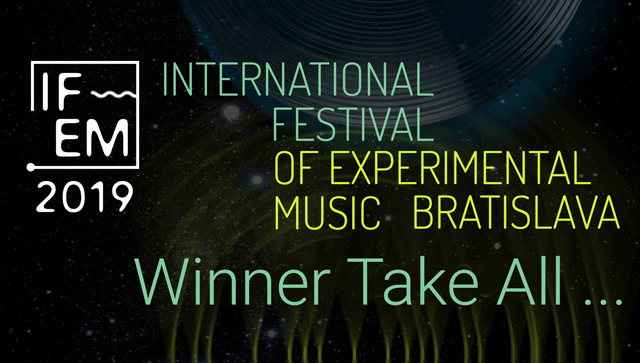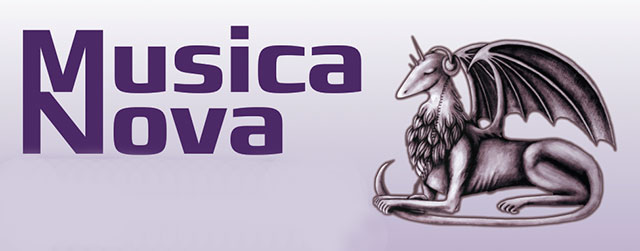
Publicly supported by the Slovak Arts Council
Winner Take All … | Prize awarded compositions :: Musica Nova :: TEM :: PRIX Rusollo |
sonicART CONCERT Programme:
- Epa Fassianos – Chromatocosmos (GR) 7.50 min. | Musica Nova 2018
- Robert Scott Thompson – Nullius in Verba (USA) 9.00 min.| Musica Nova 2018
- Jan Kruml – “fragile” (CZ) 8.57 min. | Grand Prix Rusollo 2017
- Francesco Marchionna – I Giorni Sospesi (I) 8.54 min.| Taukay Edizioni Musicali 2018
- Pablo Martín Freiberg – Reflejos In-Condicionados (RA) 6.40 min. |Taukay Edizioni Musicali 2018
- Damián Lauraro Gorandi – La machinerie d’un imaginaire (RA) 8.57 min. | Grand Prix Rusollo 2017

| Epa Fassianos – Chromatocosmos (GR) 7.50 min. | Musica Nova 2018
Biography:
Epa Fassianos is a Greek composer of electroacoustic music. He was born in Athens in 1982. He has attended both the University of York (MA in Music Technology) and the University of Sussex (MA in Composition for Media and Film and MPhil in Musical Composition). His BA in Greece was in Informatics and Computer Technology. He has also obtained his Piano Diploma in 2003 with Professor Dimitris Toufexis. In parallel, he has obtained the Diplomas in Harmony, Counterpoint and Fugue respectively. At the moment he is a PhD student in acousmatic music (submission period) at the University of Manchester (NOVARS Research Centre), under the supervision of Professor David Berezan. His area of interest is: Creating works of acousmatic music based on aspects of Greek Culture (Religion, Traditional Greek Instruments, Mythology).
Chromatocosmos:
Chromatocosmos (2015): A stereo fixed – media electroacoustic piece which is based on Baghlamas’s original recordings. Baghlamas is a traditional Greek instrument which has its roots to an Ancient Greek instrument called Pandoura. In my work I made an attempt to explore the characteristics of the instrument and its relation to history and Hellenic Culture via acousmatic music. The work has references to melodic lines widely used by Baghlamas’ performers but is mainly an attempt to recreate a new sonic world. I also aimed to use the instrument in innovative ways, from the recording process (use of sounds emerging from the chording of the instrument) to the development process (application of a wide range of transformations which would lead the sound in new boundaries). The addition of background cinematic-style sounds emerging from the Baghlamas through various transformations, creates a constant dialogue with the foreground sounds. The various sonic colours observed as the piece evolves justify its title.

| Robert Scott Thompson– Nullius in Verba (USA) 9.00 min.| Musica Nova 2018
Biography:
Robert Scott Thompson is a composer of instrumental and electroacoustic music and is Professor of Music Composition at Georgia State University in Atlanta. He is the recipient of several prizes and distinctions for his music including the First Prize in the 2003 Musica Nova Competition, the First Prize in the 2001 Pierre Schaeffer Competition, and awards in the Concorso Internazionale “Luigi Russolo”, Irino Prize Foundation Competition for Chamber Music, and Concours International de Musique Electroacoustique de Bourges – including the Commande Commission 2007.
Thompson’s work in the area of computer music is oriented toward high modernism in the tradition of the founders and pioneers of the field such as Pierre Schaeffer, Stockhausen, and Xenakis. His music is also informed by the naturalistic soundscape and importantly notions of contemporary expressions in chamber and orchestral music. Thompson’s aesthetics attempts to blend and meld the real and imaginary into a musical context that invites deep listening and engagement in the listener. The music – the tonality, sonority, transformation of materials – is the primary focus rather than the outworking of a specific technique or technology. In recent years Thompson has become an adherent of the techniques of ambisonic spatialization and increasingly creates work that is based in this approach to both multi-channel and stereophonic presentation.
Nullius in Verba:
Nullis in Verba translates from the Latin as “on the word of no one.” This acousmatic composition incorporates field and studio recordings and their transformation and elaboration. Sound sources include vocal, percussion, flute and ‘cello sources together with mechanical and environmental sounds. The music is conceived as a kind of “song without words,” and in working on it, I was reminded of Mendelssohn: “What the music I love expresses to me, is not thought too indefinite to be put into words, but on the contrary, too definite.” Techniques used for the work include ambisonic spatialization and spectral transformation methods. Tools used include Kyma, Csound, Metasynth, Cecelia, Trajectory and Spat Revolution.

| Jan Kruml – “fragile” (CZ) 8.57 min. | Grand Prix Rusollo 2017
Biography:
Narodil jsem (znamení: Ryba) se jako dítě převratu v březnu roku 1968. Díky velké odvaze maminky znásobené tehdejší politickou situací v socialistickém Československu jsme se sebrali a jeli do severní Afriky, kde jsem prožil dětství.
Hlasitá arabská hudba zněla odevšud. Aniž bych tehdy vědel co je to remix, poslouchal jsem, jak se tony prolínají a mixují s volaním muezína.
O elektronickou hudbu se v celé jeji škále zajímam od jejího prvopočátku. Když jsem koncem sedmdesátých let poprvé slyšel zvuk Kraftwerk, vše se pro mne změnilo.
Po návratu do Čech jsem na začátku 80. let přičichl k DJování. Tenkrát se hrálo výhradně z 7″singlů, které bylo je velmi težké sehnat. Já měl ale rád prodloužené 12″ maxi singly, které sbíram dodnes. Stále jsem po kamarádech nahrával kazety a chodil obchodovat na burzu s deskama. Dnes hraju aka DJ Fia5co. Jako fotograf občas jezdím po koncertech a festivalech. Mám rád: lidi, fotografování, výstavy, festivaly, koncerty a cestování. Otevřeně přiznávám silnou závislost na elektronické muzice.

| Francesco Marchionna– I Giorni Sospesi (IT) 8.54 min.| Taukay Edizioni Musicali 2018
Biography:
Epa Fassianos is a Greek composer of electroacoustic music. He was born in Athens in 1982. He has attended both the University of York (MA in Music Technology) and the University of Sussex (MA in Composition for Media and Film and MPhil in Musical Composition). His BA in Greece was in Informatics and Computer Technology. He has also obtained his Piano Diploma in 2003 with Professor Dimitris Toufexis. In parallel, he has obtained the Diplomas in Harmony, Counterpoint and Fugue respectively. At the moment he is a PhD student in acousmatic music (submission period) at the University of Manchester (NOVARS Research Centre), under the supervision of Professor David Berezan. His area of interest is: Creating works of acousmatic music based on aspects of Greek Culture (Religion, Traditional Greek Instruments, Mythology).
Chromatocosmos:
Chromatocosmos (2015): A stereo fixed – media electroacoustic piece which is based on Baghlamas’s original recordings. Baghlamas is a traditional Greek instrument which has its roots to an Ancient Greek instrument called Pandoura. In my work I made an attempt to explore the characteristics of the instrument and its relation to history and Hellenic Culture via acousmatic music. The work has references to melodic lines widely used by Baghlamas’ performers but is mainly an attempt to recreate a new sonic world. I also aimed to use the instrument in innovative ways, from the recording process (use of sounds emerging from the chording of the instrument) to the development process (application of a wide range of transformations which would lead the sound in new boundaries). The addition of background cinematic-style sounds emerging from the Baghlamas through various transformations, creates a constant dialogue with the foreground sounds. The various sonic colours observed as the piece evolves justify its title.

Biography:
Pablo M. Freiberg was born in Buenos Aires, Argentina, in 1974. He studied at the National Universitary Institute of Art , where he obtained the Music Professor Degree, and the Musical Arts Degree -specializing in music composition-. Also, he studied composition with recognized compositors such as F. Maglia, G. Pozzati, and M. Calzón. He has attended seminars of psycology of music at La Plata University.
Reflejos In-Condicionados:
Ha sido confeccionada a partir de premisas relacionadas con aquello a lo que el propio compositor ha denominado “Composición Neuropsicológica”.
Para su composición, se ha recurrido al uso de estrategias provenientes de la psicoacústica, la psicología y la neurología tales como la “escucha analítica y sintética”, los “batidos binaurales” y el “glissando Shepard-Risset” (a modo de “Reflejos Incondicionados”), y tres citas provenientes de diversas obras (en alusión a los “Reflejos Condicionados”). La obra propone un modo compositivo por el cual se intenta inducir a los oyentes, de manera explícita, y mediante la aplicación de procedimientos provenientes de las disciplinas antes mencionadas, a transitar por diversos estados de ánimo.

| Damián Lauraro Gorandi – La machinerie d’un imaginaire (RA) 8.57 min. | Grand Prix Rusollo 2017
Biography:
Damián Gorandi was born in Buenos Aires on of 1991, Argentina. He obtained the scholarship of “ibermusicas” to studie with Joao Pedro Oliveira (Brasil). The scholarship in Weimar (Germany) to take classes with Robert Normadou. The scholarship in Cmmas (Visiones sonoras 2017, Mexico). The scholarship of the “Fondo nacional de las artes” ( Argentina). Residence at the study EMS (Sweden). Residence at the study UFMG (Brasil). His Artistic works and composition was declared like ” High cultural and artistic interest” by the Ministry of Culture Argentina. Studies composition in the conservatory “Alberto Ginastera”, Buenos Aires (Arg). Study composition with, Fernando Maglia , Elsa Justel , Ricardo Mandolini and Jorge Sad.
La machinerie d’un imaginaire:
The theme of the work is based on the ideas of Luigi Russolo and his vision about the machines. The work reveals the voyage of an unknown machinery conceived as a multi-object. The curious thing is that the trip of this machine happens through different layers belonging to an imaginary stratigraphy, that is to say that it perforates and exploring the hidden recesses of the imagination. The machine works as a leitmotiv that articulates the different sections. The structure of the work is subject to the voyage mentioned before. From the beginning of the work to the minute 5’25” is transited by four stratums, and it is from here, that emerges the fifth and last stage, as a dream to which is reserved the biggest depth in the internal space of the entire work in analogy to the area of more profundity of our imagination. After this section a rallentando announces the return to reality. The motor of the machine stops at the end of the work, so the “silence“ of the concert hall is the reality.

en iyi meme büyütme doktoru
Asking questions are actually nice thing if you are not understanding something completely, except this post offers good understanding even.|
eskil medya